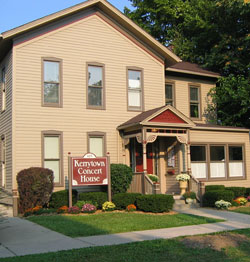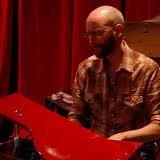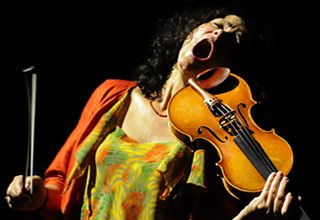The 3rd annual Vital Vox Vocal Festival, this year being held at Roulette in Downtown Brooklyn (Sat, Nov 5th and Sun, Nov 6th, 8 PM), is not just about singers, but those that are equally skillful at creating music. On November 5th and 6th, there is a sensational lineup of artists that are gifted at both of those as well as skirting genre lines between new classical, indie, jazz and world music. (more…)

As those of you who regularly read my reports from Ann Arbor know, most of the new music I cover is related to the University of Michigan, usually in the form of a student composer concert, a performance by the resident Contemporary Directions Ensemble or the appearance of a contemporary work or two on a Symphony Band concert. Beyond these highly active groups at the Michigan School of Music, our town is gifted with two wonderful concert presenting organizations who regularly feature contemporary music on their programs: the University Musical Society and the Kerrytown Concert House. Last year I attended several UMS events, but hadn’t stepped inside KCH as an audience member until last week when composer Ezra Donner invited me to hear the Aurea Silva Trio premiere his work Variations for Flute, Bassoon and Piano.
More so than UMS, the Kerrytown Concert House focuses on experimental programming and intimate presentations, garnering recognition from the Nation Endowment of the Arts for their important role in the music community of Southeastern Michigan and, frankly, the whole country. Unbeknownst to me, KCH has hosted a new music/jazz festival called “Edgefest” for fifteen years, which wrapped up last month. Although, I missed out on an opportunity to report on that concert series, I was able to catch a bit of new music there last week with the aforementioned recital by the Aurea Silva Trio.
Commissioned for the Trio, Variations reflects a consistent theme in Mr. Donner’s music: the influence of his upbringing in the Rust Belt of western Pennsylvania. To my ears, the connection was apparent in the first, expansive sonority of the piece, which ascends from the rumbling depths of the bassoon’s lowest register to the higher ranges of the flute and the piano. This section is the theme of what Mr. Donner called a, “classically oriented theme and variations” in pre-concert remarks, and does more than establish the root of all the subsequent music, it introduces bassoonist Gareth Thomas as a very prominent figure in the narrative of the work. Beyond the structure, the only stylistic allusion to classical tradition occurs with one variation I noted as a, “demented waltz”. I found the link impossible to ignore thanks to the section’s typifying meter and accompanimental pattern in the piano, though the passage’s melodic material is more of a grotesque caricature of than a respectful homage to traditional waltz music. As the variations continue, the ‘waltz’ music returns in a decayed form while the bassoon maintains its status as the principle melodic figure in the work – until the theme comes back. With the bassoon relegated to its lowest range, pianist David Gililand and flutist Brandy Hudelson are given an opportunity to expand on what we’ve heard before, leading to a rousing conclusion that caused one attendee – luminary America composer William Bolcom – to call out “good!” before the Trio could take its first bow.
[youtube]http://www.youtube.com/watch?v=nL5Kym7hVFI[/youtube]
Well, slightly. Steve Smith’s terrific review of the ACME/MNMP/Sequenza21 concert at Joe’s Pub Tuesday night is now up online. And, if you’re arriving via the Times link, welcome. Come back regularly. We’ll find something to amuse you.

Up until this last weekend, the true new music season was yet to begin at the University of Michigan. True, fabulous the Symphony Band and members of the performance faculty have already made fabulous presentations of contemporary music (as I’ve written about), but the two groups most dedicated to the work of living composers – the students of the Composition Department and the Contemporary Directions Ensemble – did not start their engines before last Saturday.
Although it is gaining momentum at the University of Michigan, the Contemporary Direction Ensemble is one of Ann Arbor’s best kept secrets, thanks in large part to its dynamic director Christopher James Lees. Maestro Lees’ commitment to new music is only matched by his charisma and musical ability. In the case of the group’s first concert of the season on Saturday, all three of these qualities were overshadowed by Mr. Lees’ perspicacious programming. If I wanted to be understated, I would say the selection and ordering of works was immaculate, but I prefer language more elaborate. I was entrained from beginning to end by the beguiling ebb of instrumental strength, musical style and length as each work passed to the next. Collectively, the pieces Mr. Lees selected attacked me, beckoned me, mesmerized me, connected me to an imagined past, nuzzled me, astonished me and drove me to tap me feet. It was the most engaging, well-constructed and consistent new music event I’ve ever attended. So, without discussing (or identifying!) any of the individual works and performances, I can confidently declare that, at least on Sunday night, Maestro Lees and his performers were far beyond reproach.
The first work on the program was Chris Theofanidis’ Raga (1992), scored for pierrot-plus. As the program note mentioned, the piece makes many allusions to Indian music, mainly through the use of drones, melodic slides and the bongo drums’ ‘faux-tabla’ groove. Overall, the work moves from simplicity – one note colored variably in the ensemble – to more melodic complexity. Raga is tied together by the consistency of the melodic material and the two percussion parts: the bongos are omnipresent and gong hits accompany most of the important structural delineations in the piece. As I’ve indicated, all the melodic/harmonic material is very closely related throughout, so development takes place in subtle ways such as increased ornamentation when melodies return, thickening the contrapuntal landscape (which produces a kind of whitewash effect since the mode is shared in all the lines), and so forth. The only notable contrasting ideas come in the form of dissonant clusters in the piano, which play an important role in leading the piece to its climatic conclusion of towering, static harmonies.
Unfortunately, I couldn’t make it to the concert last night. If you were there, leave a note and tell me how it went.
Sequenza 21 and Manhattan New Music Project present
ACME in Concert
Tuesday October 25, 2011 at 7 PM
Joe’s Pub, NYC
American Contemporary Music Ensemble (ACME)
Yuki Numata, Caroline Shaw, violins
Nadia Sirota, viola
Clarice Jensen, cello
Jonathan Singer, percussion
Timothy Andres, piano
Program
Wily Overture … Christian Carey (premiere)
Welcome … Nancy Kleaver (MNMP)
Requests … David Smooke
Grand Dragon (excerpt from Speedvisions) … Rob Deemer
Slumber Music … Jay Batzner
Steal Away (excerpt from O Sapentia) … Hayes Biggs
Intermission –
Linea Negra … Laurie San Martin
Refuge … Sam Nichols
Sixteen Lines … Robert E. Thomas
How it Will Go … Dale Trumbore
Oracle Night … James Stephenson
Nostos-Algea … James Holt
This concert was made possible by the generous support of Manhattan New Music Project (www.mnmp.org), and Sequenza 21 (www.sequenza21.com) publisher Jerry Bowles
Recording: Glenn Freeman of OgreOgress Productions (www.ogreogress.com)
Program committee: Clarice Jensen, Hayes Biggs, and Christian Carey
ACME Management: Bernstein Artists, Inc.
ACME Publicist: Christina Jensen
Thanks: Nancy Kleaver & Max Freedman of MNMP, Jerry Bowles, Steve Layton, Sue Renée Bernstein, Christina Jensen, Canelle Boughton, Glenn Freeman, Justin Monsen; the staff at Joe’s Pub: Shanta Thake, Sara Beesley, Michele Renkovski, & Patricia Bradby.
Special thanks: to the musicians for their dedicated work preparing the program; to the featured composers for their beautiful music; and to all the members of the Sequenza 21 and Manhattan New Music Project communities, without whom this event would not be possible.

Clarice: So, ahem, Nadia it was pretty remarkable when we switched from reading from the score to parts when we were working on Hayes’ piece (ed.: Steal Away by Hayes Biggs). It’s like the music took on a different meaning.
Nadia: I know!! I find that stuff so incredible. Sometimes I forget that a massive portion of our jobs as musicians (especially of the new music persuasion) is essentially translating visual material into sound. We’re kind of like professional map-readers. Do you have any notational pet peeves?
Clarice: Page turns of course… But other than that, just spacing in general. If notes look all bunched up, then it’s hard not to make them sound that way! What about you?
Nadia: My super-dork pet peeve is spelling; I hate it when chords are spelled out in ways that have little regard for traditional chord structures. It’s sometimes really hard to wrap your brain around a whole bunch of sharps and flats living together all higgledy-piggledy without regard for implied harmony. I know I know: super-dork. That having been said, I kind of love how notation is a kind of personal, no two alike sort of thing. It gives the performer so much insight as to how the composer may be thinking. Oh! And I can get kinda frustrated with things that are notated with very small durations (64th and 128th notes) which are then in a super-slow tempo. I understand a kind of freneticism may be what the composer is going for, but it just seems to add so much time to the rehearsal/parsing process.
Clarice: Totally agree on that one. Pretty amazing how this abstract system of symbols and lines and dots can be subject to so much scrutiny and discussion regarding interpretation. And how dots and lines paired with scrutiny and discussion results in beautiful music! Amazing!
Nadia: Yay! So, I’ve been thinking a lot lately about the type of music and programming that translates well live vs. that which is great to listen to on the radio or on a recording. There are so many types of gestures which are fascinating to watch people achieve, which cannot be really understood in a recording. Like even a pregnant pause, for example.
Clarice: For sure – the physicality of achieving a musical gesture just can’t be heard in a recording, and sometimes seeing that gesture is what makes the music translate to the audience. However, would you say that there is any music that makes more sense recorded rather than live? What about music in the rock/pop world?
Nadia: Oh decidedly. Stylistically that’s an idea Classical peeps kind of “borrowed” from the pop world to begin with, even going so far back as Musique Concrète territory. Like, think about how many times we’ve heard the exact same performance of a song like “Louie Louie.” That performance IS the work itself. Everything else is a “cover.” This can seem like a weird, alien counterpart to the Classical model (like, do I only do covers???), but yeah, there’s a lot more of that type of thinking these days, from things like John Adams Light Over Water to Nico Muhly’s The Only Tune, a piece I’ve performed a lot. When that piece was conceived it was as a recorded collage. When we play it, we are trying our damnedest to approximate the recording. It’s sort of the opposite type of problem from what we were talking about above, the “why does this music lack the visceral impact it had live on this record” type of problem.
Well, I’m super into the diversity of voices on this program. I get to wear a lot of different hats! (Jagged hat, lyrical hat.)
Clarice: Yes, I think the variety of pieces we ended up with is pretty emblematic of the wide range of excellent writing and composition that’s happening now. And as a performer, it really is rewarding to wear all of these hats! I mean, I’ve always considered lyrical playing to be a personal strength of mine, but over the years I’ve worked so hard on rhythmic accuracy through playing intricate music, and now I consider that to be a strength as well. It’s amazing how all of this diverse writing is in fact shaping the performers who are often playing music in the contemporary world. Do you think your focus on new music has changed you intrinsically as a performer?
Nadia: Oh, totally. Whenever you work on some weird skill, it changes the kind of mental space in which you think about everything else, really. The rhythmic idea you bring up is super apropos; I also kind of came from a lyrical place as a kind of a default, but the more I work on concepts of groove and flow, the more these ideas end up creeping their way into even the most lyrical stuff. Knowing more things as time goes on rules.
Well, lovely to chat with you, C, I can’t wait for the show!!
Clarice: Yep yep, it’s gonna be a good one!
_______________________
Tickets to the Sequenza 21 Concert are free (the venue charges a $12 food/drink minimum).
October 25 at 7 PM
Joe’s Pub in NYC
Tickets and Tables are still available by phone.
Call 212.539.8778 to make your reservation

On Requests
A guest post for File Under?
Back in 2003, the incredible pianist Amy Briggs (and if you don’t know her playing, you should check out some of her performances of the David Rakowski Etudes on YouTube) was approached by the music department at U.C. Davis to engage in a residency built around the idea of new tangos for piano. As part of the project, they asked Amy to build an entire concert program of tangos, each of which needed to be no longer than three minutes. She could use completed pieces and have others write for the project, and the Davis composition faculty (including Laurie San Martin) all agreed to write new works for her and to arrange for her to record a CD of the entire concert repertoire. Amy chose me, along with several wonderful composers like Hayes Biggs, to write a new tango of no more than three minutes. She toured with these pieces for several years and the entire project is now available via Ravello Records and at Naxos.

When Amy first approached me to contribute to this project, I was both excited and quite fearful. Tangos long ago achieved the status of major cultural achievements, basically functioning as the national musical style of Argentina. As an outsider with relatively little experience of this genre I felt that there was little that I could add. At the same time, it would have been disingenuous to write a generally inspired piece and to cavalierly claim it as a tango, and I very much wanted to work with Amy and to be involved with this endeavor.
After listening to many traditional tangos for various ensembles and several experimental composers’ reinterpretations of this form, this piece began to take shape. I retain the staggered rhythm in the first half of the measure that is the most recognizable element of the traditional form, using it as an accompaniment for a simple and mournful melody that to my mind evokes the mood of the dance. The piece then presents variations on this melody. Perhaps more important than these purely musical impetuses was my attempt to portray the various aspects of the tango itself as though constantly refracting through the emotions of the dancers and the scene itself as viewed by the participants and audience. For this reason, Requests continually presents sudden shifts in mood and affect as the perspective jumps from the internal to the external and between the various perspectives on each level.
Since I knew I was writing for an astonishingly virtuosic player, as I composed this piece I allowed myself to be pulled constantly towards ever-greater feats of pianism, making this short work very daunting for most players. I’m thrilled that ACME has chosen to present Requests on the Sequenza21/MNMP concert and look forward to hearing all the pieces at Joe’s Pub this week.
– David Smooke chairs the music theory program at Peabody. He blogs regularly at NewMusicBox and plays a mean toy piano.
Sam Nichols teaches at UC Davis. His string quartet ‘Refuge’ is on the Sequenza 21/MNMP Concert this coming Tuesday (7PM at Joe’s Pub in NYC. Did we mention it’s free?).
In 2009 the Left Coast Chamber Ensemble asked me to write a string quartet. I was happy, for a number of reasons, but mostly because they bring a tremendous amount of oomph to any project. At the time, though, I was working on another piece, a trio, that was giving me a lot of trouble. Make that: a LOT of trouble. Pounding my head against the wall trouble, breaking pencils in half trouble, putting in an accent and then taking it out again trouble. Working on this trio was taking up a lot of time, and I had blown past the deadline. Meanwhile, the deadline for the new string quartet was approaching. So, I set aside the trio—it was already late, and I seemed to be stuck—and started the quartet. I didn’t have a lot of time, about six weeks (and I usually write pretty slowly; there’s usually a fair amount of moving down blind alleys, and retracing my steps sort of thing), and so there was a certain amount of adrenaline involved: I was already mired in one stalled-out project; I really didn’t want that to snowball into an unmanageable situation, where EVERYTHING I was writing was late. Yikes.
The Left Coast were going to play Beethoven’s Grosse Fuge; they asked me to design my string quartet as a sort of companion piece to the Beethoven. This was slightly terrifying—okay, more than slightly. But I tried to ignore that, and started to work. The first thing I decided was: I really couldn’t see my way clear to writing a fugue. But I thought it might be fun to take some of the basic ideas of fugal writing, twist them around, and use that as a jumping-off point. So, for example, instead of writing a traditional contrapuntal texture, I created a blurred, out-of-focus unison line that’s been twisted and tweaked. The four instruments are sometimes playing the same tune, but are ornamenting it differently, or are playing it at slightly different speeds. This results in a rough sort of do-it-yourself canon—anything but strict—where the lines are sometimes piled up very closely, and at other times are separated from each other quite dramatically.
The title, Refuge, started out as a pun. I often use a temporary working title, and once I figure out what I’m doing, I might throw the first title away, and replace it with something better suited to the piece. So, in quickly slapping a title on my string-quartet-in-progress, I chose “refuge:” not a fugue (or “fuge,” to revert to Beethoven’s language), but a re-imagining of fugue/fuge: re-fugue, or re-fuge. And for a few weeks, I left it at that.
But as I wrote the music, a simpler interpretation of the title started to appear. The piece is very episodic: just as one musical structure is established, it’s replaced with another. It’s almost like an Etch-A-Sketch; an image emerges, but then it’s (sometimes quite violently) shaken up and wiped clean. So, over and over, the piece seems to move toward quieter, restful episodes: little in-between bits of music that, until they’re disrupted, offer moments of calm. This pattern, of moving through active, violent sections (including passages which seem to bristle with hostility) toward calmer havens, became one of the basic ideas of the piece. Maybe the title exerted a sort of pull on the music? Or maybe it was a coincidence. Now, two years later, I can see that writing this piece offered me a kind of refuge. It allowed me to escape from the trio I had been writing (which I eventually returned to and finished). But in a larger sense, it helped me loosen up, and find a more personal way of putting together a piece.

